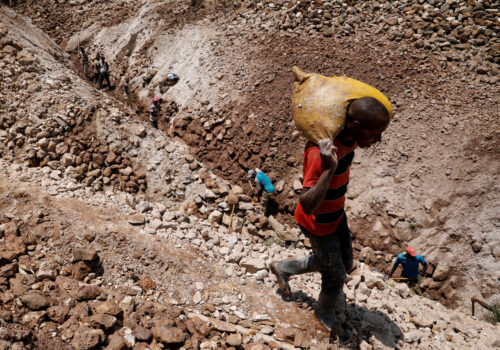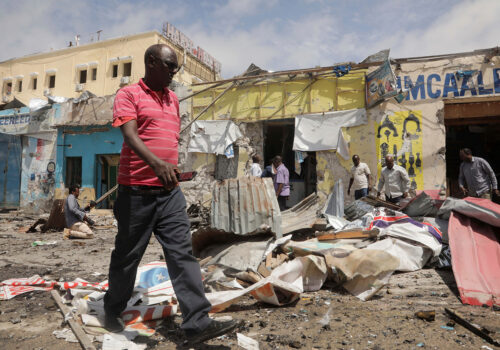While it is still early in the term of the second Donald Trump administration, July has already proven to be another eventful month for both the White House and Congress. For one, the passage of the One Big Beautiful Bill Act coincided with ongoing trade negotiations with the EU regarding tariffs, which were initially set to be resolved by a July 9 deadline. That deadline has since been postponed. Meanwhile, over one thousand three hundred diplomats were laid off from the State Department, and the same week—from July 9 through 11—five West African leaders gathered for a special three-day meeting with Trump. Amid the flurry of news, it may have been easy to overlook this mini summit, which included the leaders of Gabon, Guinea-Bissau, Liberia, Mauritania, and Senegal and featured a televised lunch with the president. The fact that the meeting appeared to meet US expectations may have contributed to its low profile. For the West African leaders present, however, it likely failed to adequately address their single most pressing concern: security in the Sahel.
Strategic minerals, migration, and commercial policy
The first Trump administration’s focus on Africa was laid out in the “New Africa Strategy,” unveiled by National Security Advisor John Bolton in December 2018. The strategy centered on three pillars: prosperity, security through “countering the threat from radical Islamic terrorism and violent conflict,” and stability. In contrast, with his invitation of five West African leaders within the first six months of his second term, Trump now seems to focus on a different set of priorities: securing critical and strategic minerals, tackling migration issues—including a proposal to accept US deportees—and prioritizing commercial policy. Taken together, these shifts likely set the tone for the administration’s Africa policy going forward.
During the summit luncheon, Trump praised Africa’s abundant natural resources, highlighting its “very valuable lands, great minerals, and significant oil deposits.” Ensuring US access to Africa’s critical mineral reserves remains a top priority for the administration—and Gabon, Guinea-Bissau, Liberia, Mauritania, and Senegal are all rich in these strategic resources.
Regarding migration, Trump underscored the need for countries to take back nationals residing unlawfully in the United States, and suggested they might also consider accepting deportees from third countries. He asked West African leaders how they might help address the issue. President Umaro Sissoco Embaló of Guinea-Bissau later rejected this suggestion, stating that taking in third-country nationals would violate his country’s policies.
On the economic front, the administration’s approach to commercial diplomacy—characterized by the principle of “trade not aid”—signals its intent to make economic engagement the primary mode of interaction with African nations. Embaló framed Trump’s approach as one focused on creating a “win-win partnership,” expressing optimism that more US businesses would invest in his country following the summit. Trump also urged African leaders to bolster their defense spending and procure more US military equipment, touting it as the best available. This emphasis on business-led engagement underscores the administration’s “America First” agenda as it seeks to reclaim influence in regions where China and Russia have gained ground.
The Sahel as a blind spot
What the summit notably lacked, however, was a detailed discussion of the pressing security challenges facing West African nations, particularly the deteriorating situation in the Sahel. According to the Armed Conflict Location and Event Data Project (ACLED), the Sahel is currently the world’s epicenter of terrorism and the fastest-growing hotspot for jihadist extremism. In fact, ACLED has placed the Sahel and Coastal West Africa on its conflict watchlist for 2025. This is primarily due to an entrenched jihadist insurgency in the region—led by the al-Qaeda-affiliated Jama’at Nusrat ul-Islam wa al-Muslimin (JNIM) and the Islamic State-Sahel Province—that continues to expand, with violence against state forces, militias, and civilians escalating steadily.
During last week’s summit, Trump acknowledged the ongoing security challenges in the Sahel by referring to terrorism as Africa’s “big problem” and urging continued efforts to combat it. However, summaries of the meetings suggest that no specific actionable measures were taken, nor agreements made, to address security and counterterrorism.
In part, this might be due to the fact that the administration is still reassessing the US military’s global posture, particularly in Africa, and weighing how to best respond to security threats like the one unfolding in the Sahel. If its emerging strategy relies solely on commercial diplomacy and transactional economic engagement, however, it risks falling short. With extremist violence increasingly spilling across borders, the administration will need a more robust and coordinated approach to the crisis in the Sahel before the end of its term.
A new approach to West Africa
This new approach should outline a more comprehensive plan that includes robust support for African-led security initiatives. The administration should focus on coordinated investment across civil, military, and commercial infrastructure, as well as stronger regional cooperation among African states. After all, the social and economic interdependence that emerges from a more resilient and connected society can help close the fissures that extremists seek to exploit. Such an approach would lay the groundwork for a more productive and enduring US-Africa partnership.
While last week’s summit with African leaders marked a promising beginning, the deteriorating security situation in the Sahel must remain central to any long-term vision for regional stability and the continent’s economic future—and should be a priority at the upcoming US-Africa Leaders Summit this fall. It’s worth remembering that the Sahel was not always a hotbed of extremism. On the contrary, it was once renowned for its intellectual vitality, freethinking societies, and a tolerant version of Islam.
Like all sources of civil unrest, security issues left unaddressed do not improve over time. The al-Qaeda and Islamic State groups in the Sahel have expanded their presence from a limited foothold in northern Mali in 2012 to controlling vast swaths of territory across the region—reaching as far as the northern borders of coastal West Africa. The Trump administration’s Africa strategy emphasizes securing strategic minerals, addressing migration concerns, and enhancing commercial diplomacy through US business investments. But now is a critical moment to confront the security crisis in the Sahel, which threatens to undermine any purely economic approach to the region.
As history has shown, regions once renowned for knowledge and peace are often those that prosper, but they can just as swiftly descend into conflict. The Sahel need not follow that path. Areas now plagued by jihadist violence—often fueled by deep economic disparity—can be transformed into hubs of peace and economic opportunity. It is time for a renewed approach to the Sahel.
Rose Keravuori is the former director of intelligence at the US Africa Command and is currently an associate director at Strategia Worldwide.

The Africa Center works to promote dynamic geopolitical partnerships with African states and to redirect US and European policy priorities toward strengthening security and bolstering economic growth and prosperity on the continent.
Further reading
Wed, Jul 16, 2025
MMA’s arrival in Africa could transform opportunity for the continent’s youth
AfricaSource By
Africa is no longer just a source of talent but increasingly a hub for global sports investment and innovation.
Wed, Apr 23, 2025
Illicit mineral supply chains fuel the DRC’s M23 insurgency
EnergySource By
The illicit trade of mined materials is fueling the M23 insurgency in the eastern Democratic Republic of the Congo (DRC), threatening regional stability and hindering development. As the United States considers a minerals-for-security agreement with the DRC, international engagement, ethical sourcing practices, and strengthened oversight are critical to fostering long-term peace in this resource-rich region.
Thu, Apr 17, 2025
The US must sustain counterterrorism operations in Somalia—the costs of retreat are too high
New Atlanticist By
To maintain a foothold in East Africa’s security architecture, the US must prioritize continuity, including keeping the US embassy in Mogadishu open.
Image: Senegalese President Bassirou Diomaye Faye, Guinea-Bissau President Umaro Sissoco, Mauritanian President Mohamed Ould Ghazouani, Liberian President Joseph Boakai, and Gabon President Brice Oligui Nguema attend a lunch hosted by US President Donald Trump in the State Dining Room at the White House in Washington, DC on July 9, 2025. Photo via REUTERS/Kevin Lamarque.




